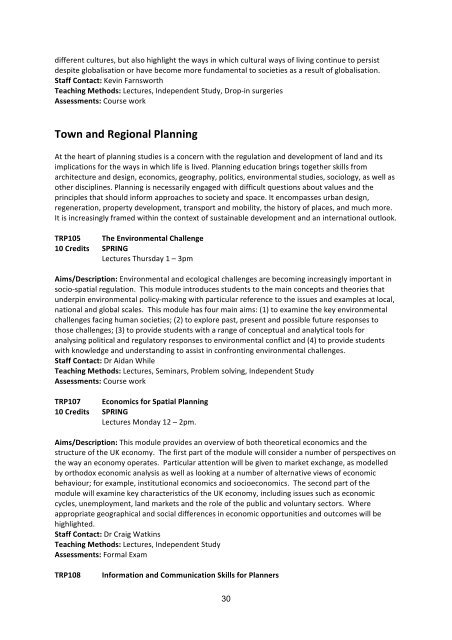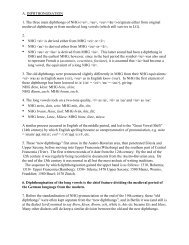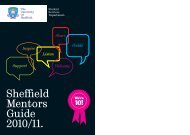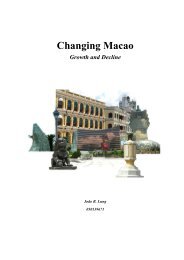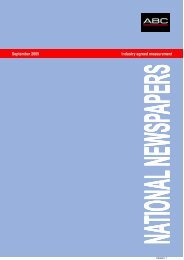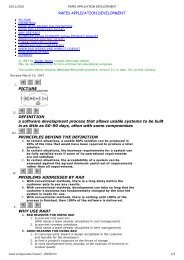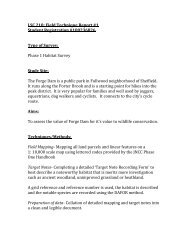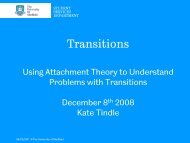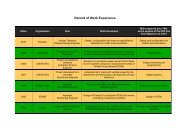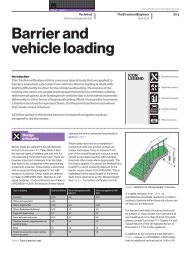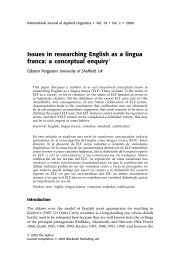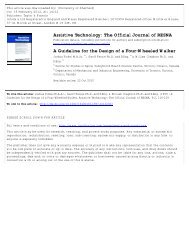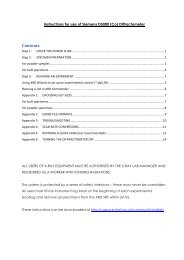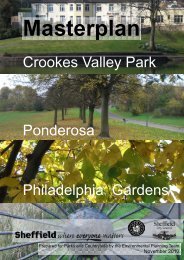Free Modules SOMLAL.pdf
Free Modules SOMLAL.pdf
Free Modules SOMLAL.pdf
Create successful ePaper yourself
Turn your PDF publications into a flip-book with our unique Google optimized e-Paper software.
different cultures, but also highlight the ways in which cultural ways of living continue to persist<br />
despite globalisation or have become more fundamental to societies as a result of globalisation.<br />
Staff Contact: Kevin Farnsworth<br />
Teaching Methods: Lectures, Independent Study, Drop-‐in surgeries<br />
Assessments: Course work<br />
Town and Regional Planning<br />
At the heart of planning studies is a concern with the regulation and development of land and its<br />
implications for the ways in which life is lived. Planning education brings together skills from<br />
architecture and design, economics, geography, politics, environmental studies, sociology, as well as<br />
other disciplines. Planning is necessarily engaged with difficult questions about values and the<br />
principles that should inform approaches to society and space. It encompasses urban design,<br />
regeneration, property development, transport and mobility, the history of places, and much more.<br />
It is increasingly framed within the context of sustainable development and an international outlook.<br />
TRP105 The Environmental Challenge<br />
10 Credits SPRING<br />
Lectures Thursday 1 – 3pm<br />
Aims/Description: Environmental and ecological challenges are becoming increasingly important in<br />
socio-‐spatial regulation. This module introduces students to the main concepts and theories that<br />
underpin environmental policy-‐making with particular reference to the issues and examples at local,<br />
national and global scales. This module has four main aims: (1) to examine the key environmental<br />
challenges facing human societies; (2) to explore past, present and possible future responses to<br />
those challenges; (3) to provide students with a range of conceptual and analytical tools for<br />
analysing political and regulatory responses to environmental conflict and (4) to provide students<br />
with knowledge and understanding to assist in confronting environmental challenges.<br />
Staff Contact: Dr Aidan While<br />
Teaching Methods: Lectures, Seminars, Problem solving, Independent Study<br />
Assessments: Course work<br />
TRP107 Economics for Spatial Planning<br />
10 Credits SPRING<br />
Lectures Monday 12 – 2pm.<br />
Aims/Description: This module provides an overview of both theoretical economics and the<br />
structure of the UK economy. The first part of the module will consider a number of perspectives on<br />
the way an economy operates. Particular attention will be given to market exchange, as modelled<br />
by orthodox economic analysis as well as looking at a number of alternative views of economic<br />
behaviour; for example, institutional economics and socioeconomics. The second part of the<br />
module will examine key characteristics of the UK economy, including issues such as economic<br />
cycles, unemployment, land markets and the role of the public and voluntary sectors. Where<br />
appropriate geographical and social differences in economic opportunities and outcomes will be<br />
highlighted.<br />
Staff Contact: Dr Craig Watkins<br />
Teaching Methods: Lectures, Independent Study<br />
Assessments: Formal Exam<br />
TRP108 Information and Communication Skills for Planners<br />
30


